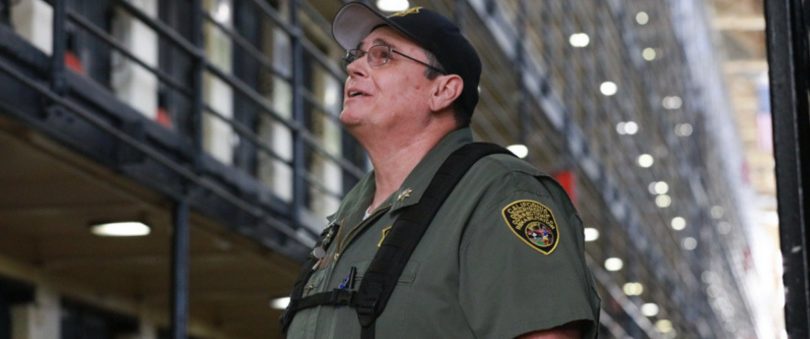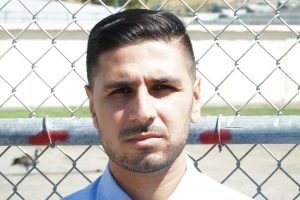Editor’s Note:
This essay, by Adnan Khan is one of a series of essays WitnessLA will be publishing, which are written through the FirstWatch project at San Quentin State Prison. With their writing, the journalists, who are also San Quentin inmates, aim to, as they put it, explore “the connections, challenges, and intimacies between self, society, and incarceration.”
(You can read earlier essays in the series here and here.)
In this essay, author Kahn examines the dehumanizing effects of the prison and jail environment for both inmates and correctional officers, and how once in a while empathy breaks through anyway.
Happy reading!
A”dap”ting to Humanity
By Adnan Khan #F-55145
When I was in Corcoran (a “level 4” maximum security prison), strict racial politics existed on the prison yard. Races were divided into different sections of the prison during yard time. The divisions between correctional officers (C/Os) and incarcerated men were even stricter. One day, for purposes of camaraderie, the men inside decided to have a basketball challenge with each other. It was five African American men versus five “others” (Asian, Pacific Islander, Middle Eastern, etc.). Both of these are segregated racial groups.
The game was intense, there was a lot of physical play, and it gathered a lot of viewers, mainly for security purposes. The African American men gathered on one side of the court, and the “other” men gathered on the other side of the court in case a riot erupted. The C/Os formed the third group that gathered. They too were preparing for a potential race riot, watching intently, radios, batons, pepper spray and gun tower all present. Basketball games in prison can get physical and competitive, which can create potential for violence in a hyper-masculine environment.
As the physical, close game went on, I did my part scoring, rebounding and playing defense. I had the opportunity to win the game with a wide open three pointer, but I missed. The ball was rebounded and returned to the other side for their game winning point.
After the game, I sat down on the side of the court, upset about my missed shot when a C/O came towards me. He approached me saying, “Man, that was a good game, you played really well man!”
As he spoke, he reached out his fist for a supportive fist bump in front of the whole yard. On the maximum security prison where I was, it was not normal for a C/O and an incarcerated person to shake hands, dap, or touch when it came to some form of respect or support. The only touch between us was for restraint or a search.
As this officer stuck his arm down toward me, it was as if everything on the yard slowed down. It felt like the entire yard stopped what they were doing, and all eyes were on me to see what I was going to do. I turned to the C/O who was eagerly waiting for his dap, then turned back to the entire yard. I looked back at the C/O again.
“Uh, it’s not cool man,” I told him reluctantly, refusing his fist bump.
He pulled back his arm, and walked away. I hung my head down, genuinely feeling bad.
I look at that incident today and I still feel bad about what I did to the C/O. The truth is, if it wasn’t for the environment that I was in, I would have accepted his support. I was afraid of being labeled a snitch, because to have that type of interaction with a C/O can be considered too friendly with the enemy. I could have had physically harm done to me.
So, because of the fear I felt in that environment, and because of the culture of division between incarcerated men and C/Os, I refused the officer’s humanity.
A few years prior to the incident at Corcoran, I encountered a similar situation in county jail. I had spent four years there, but now was sentenced and on my way to state prison. One of the deputy sheriffs who knew me the entire four years, took me into a small visit room at the end of a hallway inside the module I was housed in. I did not know what to expect since usually those types of escorts, resulted in some form of trouble.
He asked me to step in the room, and when I turned back to face him, he stuck his hand out to shake my hand. Though this was my first time being offered a handshake by a deputy, I instinctively felt safe and shook his hand. As we made contact, he gripped my hand, looked at me earnestly and said, “Thank you for all your help. I believe what’s happening to you is wrong, but keep your head up. Take care, it was an honor knowing you.”
A lot of the incarcerated men had given me support, told me to keep my head up, and gave me other words of encouragement after I was sentenced to 25 to Life. But this was so different. It meant something else to me. I felt seen. It was almost like a reminder to me that I was still human. I don’t know why it took a deputy, rather than an incarcerated person, to help me feel validated, but it did. Maybe it was because I considered incarcerated people my equal and support was expected. And perhaps it was also that what I expected from a deputy sheriff was harm.
I told him that I appreciated his words, and was thankful for how he always treated me with respect.
I believe it was our privacy that allowed us to accomplish that secret human moment. The deputy really wanted to tell me those words but he couldn’t do it in front of everyone. The environment did now allow for two human beings who were on what is understood to be opposite sides, to express their support for each other.
Historically, correctional officers and incarcerated people stand on opposing sides. The power dynamic often favors the officers. And incarcerated people generally expect to be treated as inferior in order for the C/O to maintain that control.
This means that prison environments sustain a culture of objectification. It’s an “us versus them” relationship that leaves no room for unity. Unity is illegal on both ends.
Still, I’ve experienced the power of humanity as it seeps through these barriers. The goodness in human beings sometimes can’t help but penetrate the structures that disallow empathy.
Author Adnan Khan is the Co-Founder of Re:store Justice and FirstWatch, a media project created and produced entirely by a group of journalists incarcerated at San Quentin State Prison. Khan shares his worldview through storytelling, with the hopes of using his platform to mentor youth and provide success opportunities for neglected children.
Additionally, Khan works in collaboration with survivors of crime, incarcerated men, district attorneys, CDCR officials and other stakeholders to move towards healing and integrating communities. He is currently serving a 25-to-life sentence and has been incarcerated over for 15 years.
Re:vision, where this essay was first published, is a series of personal blogs written through the FirstWatch project at San Quentin State Prison. Through traditional postal mail letters, the journalists delve into a list of topics, looking at them through a lens that includes the complex interweave of relationships between self, society, and incarceration, also opening themselves up to responding to perceptions and questions posed by the public.
FirstWatch is a media project started by a group of men incarcerated at San Quentin, in collaboration with Re:store Justice, which works in partnership with incarcerated people, survivors of crime, district attorneys, and the community. Their mission is to re-imagine and reform our criminal justice system to be one of true inclusion and justice.


